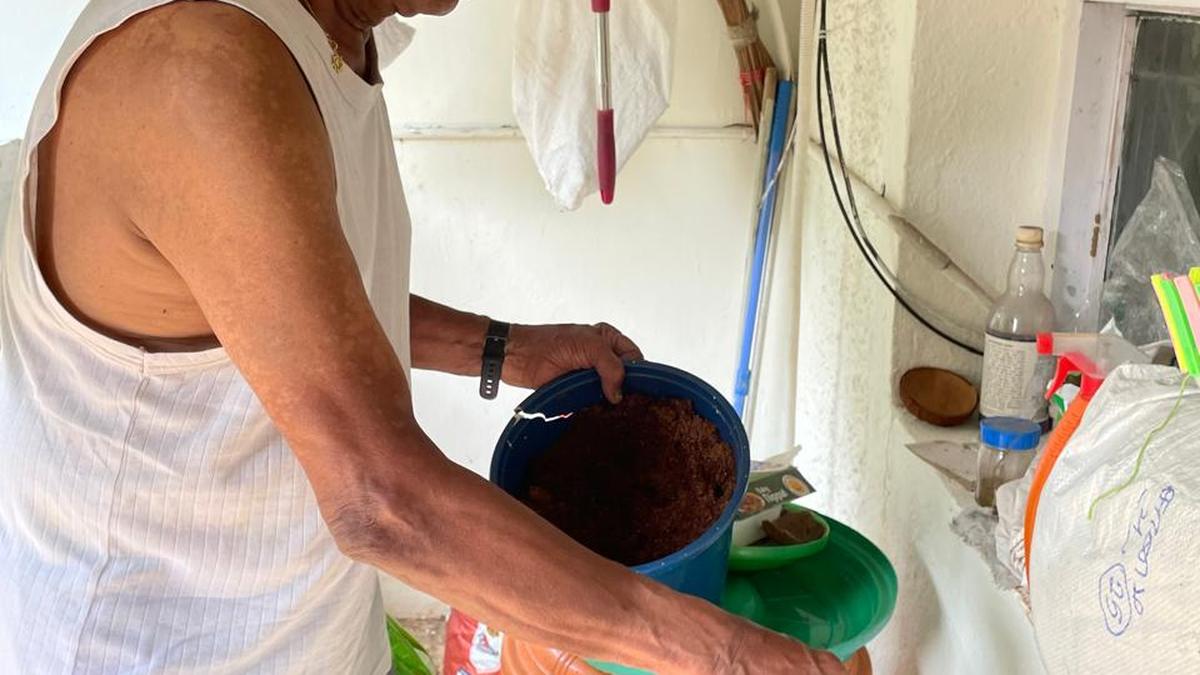
Project Composting helmed by dad
The Hindu
In the run-up to Sustainability Day, observed on the fourth Wednesday of October, here is the first in a series of articles about how people think green and impact their immediate environment in the process. The opening piece introduces three men who took up home composting in a manner that has inspired those around them to follow in their footsteps
Ananth Mahadevan is on a hamster wheel, never-stopping but spinning to two speeds, one set for the weekdays and the other for the weekend.
A software delivery manager, Ananth’s weekdays speed past in a flurry of project reports, team powwows and deadline watching. When the weekend arrives, life settles to a trot, certainly more leisurely but not less focussed. On those two days, he relinquishes the corporate hat for another, one that crowns him equally well and is worn with comparable pride. Ananth’s weekend role is that of a “sustainability manager” at home, self-appointed but he goes about it with dedication. The role involves three key result areas: waste management, home composting and promotion of eco-friendly living in his social hemisphere.
It all began during the COVID-19 lockdown. As with many others confined to their homes, Ananth found himself with extra disposable time, the commute to office having been struck out of the everyday equation. And he decided to take time out for the trash.
“I came across a few videos from influencers promoting composting techniques,” Ananth recalls. “I tried one method with dry leaves, but it did not really work for me. That is when I stumbled upon Namma Ooru Foundation’s (NOF) composting kit.” This simple kit — a 20-litre bucket and a bio-brick — turned out to be a game-changer when it was put to use harnessed to the guidelines provided by NOF.
Ananth’s debut attempt at composting meeting with noticeably impressive results, he was not going to end up as yet another dabbler in balcony composting, on one day and off the rest of the month. Before long, the engagement with composting blossomed into a passion for reducing household waste. It evolved into a lifestyle, forcing him to take a hard look at choices, quotidian yet significant. Outside of the kitchen (where he was diligently transferring biodegradable waste to the compost bin), Ananth was “altering” the look of the other rooms in his Alwarpet home. Organic tooth powder replaced the toothpaste. And in the toiletry cabinet, organic powders elbowed out soaps packed with artificial chemicals. The floors, the kitchentop and other surfaces that need to be cleaned regularly, were being treated to bio-enzyme cleaners that Ananth now began making at home.
It was a gradual shift, but once it happened, it stayed put. Sustainable living had become a core part of Ananth’s identity. “Initially, it was a hobby. But once I learned more about how long it takes for certain types of waste to decompose, it became a responsibility — a part of my life,” he explains.
Forty-three-year-old Ananth’s commitment to the planet has improved his immediate world in ways that cannot be ignored. His small garden has thrived with healthier plants and flowers, having been nourished by nutrient-rich and gentle compost. The bio-enzymes he makes at home have reduced the need for harsh chemicals, and through his overall approach to waste management, he has minimised his household’s carbon footprints. Even his son has picked up on the importance of recycling and sustainability, demonstrating the subtle but powerful influence Mahadevan’s practices have on his family. Ananth has conducted a session on waste management, particularly compositing, at his son’s school, and even secured the principal’s permission to teach it pro bono as an after-school subject. Ananth’s approach is refreshingly unpretentious. He is not an aggressive advocate, but a quiet, focused influencer within his circle of friends and family. “Some of my friends have taken it up after hearing about my journey. I do not push it, but people notice,” he says. As he reflects on his journey, he emphasises the importance of support from the hearth. “Without my family’s help, none of this would be possible,” he says. “It is a partnership — everyone has to be on board to make it work.”

 Run 3 Space | Play Space Running Game
Run 3 Space | Play Space Running Game Traffic Jam 3D | Online Racing Game
Traffic Jam 3D | Online Racing Game Duck Hunt | Play Old Classic Game
Duck Hunt | Play Old Classic Game











